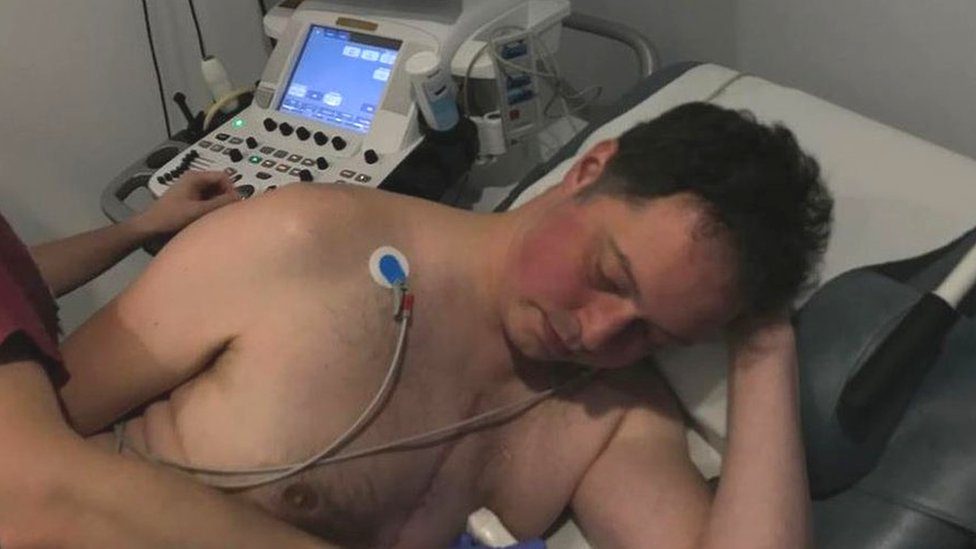Global Courant 2023-05-03 19:26:13
Chris Slegg recently discovered that his heart was failing and that a transplant might be the only way to save his life.
Being told that you are going to need a heart transplant is an overwhelming experience. I received the news, at age 43, just before Christmas 2021.
Due to a rare condition I was born with, my heart had deteriorated to the point where even the simplest of tasks, like unloading the dishwasher or hanging up laundry, were difficult for me and caused pain in my arms.
My heart failure (the inability of the heart to pump blood throughout the body) was accelerating.
When a cardiologist told me that my heart would only keep working for another year, I was devastated. The most disturbing thought was how it would affect my two young children if I were gone for much longer.
Chris SleggFor Slegg, Christmas 2021 was marked by the news that his heart could stop working in a year.
From denial to hope
It took me 15 days to gather the strength to tell my wife. Meanwhile, every day, at some point I found myself crying. The tears appeared spontaneously.
I turned to the Internet to research the topic of heart transplants. Much was written positively and with good intentions, but I couldn’t help but interpret the information negatively.
“About three-quarters of heart transplant patients in the UK live at least five years,” I read on the British Heart Foundation’s website. For me, five years sounded like a little. What if I was in the 25% that didn’t make it that far?
What if I couldn’t even find a heart? What if I found one but my body rejected it?
According to NHS figures released in March 2022, 145 adult heart transplants were performed in the UK in 2021 and 274 adults are awaiting a heart.
My thoughts are with each of those people. And I consider myself very lucky that 16 months after I was told I could join that group, so far that hasn’t happened.
Chris SleggThe sports reporter’s routine was being affected by his heart problems.
After seeking a second opinion at the Bristol Heart Institute, about 200 kilometers west of London, and at the Mayo Clinic in the United States, my cardiologists decided to try to delay, or hopefully avoid, a transplant by performing a procedure that is rarely performed on adults. In fact, I’m told that I’m likely to be the first adult in the world to have this procedure, so far.
The surgery is called the Glenn procedure. When the patient ends up on the operating table to have his tricuspid valve repaired, as I did in August 2020 (shortly before the news of the possible transplant), the medical team decides if he also needs a Glenn.
The Glenn procedure consists of separating the main vein of the body (the superior vena cava) from the heart and joining it to the main artery (the pulmonary artery). This sends some of the deoxygenated blood directly to the lungs, which means the right ventricle has a third less work to do, because it doesn’t need to pump that blood.
Without precedents
Some patients do not need a Glenn at the same time as the valve repair, but do need one later. When that happens, it’s called late Glenn.
Typically, a patient is found to need a late Glenn days, weeks, or a few months after the other procedure. But I have been told that no patient has had a Glenn as late as I have: 26 months after my valve repair.
Chris Slegg Cardiologist Hannah Douglas was in charge of giving the reporter the hard news, but she also offered him a less drastic solution than a transplant.
“There is no reported evidence that tells us about the results of such a late Glenn. You will be living proof that it can be effective,” Dr. Hannah Douglas, a cardiologist at Guy’s and St. Thomas’ Hospital in London, told me.
“We hope we have slowed down your heart failure. Your resistance to exercise and what you can tolerate will be vitally important in assessing whether we have been successful,” she added.
The rare condition I was born with is called Ebstein’s anomaly. This particular congenital heart defect occurs in approximately one in 200,000 live births in Europe and the US.
Ebstein ranges in severity, from babies who need surgery at birth, and sometimes sadly do not survive, to adults who can live a normal life expectancy without surgery.
The condition leaves the right ventricle diseased and the tricuspid valve malformed and therefore leaky. Despite the risks involved, not much is known about this condition.
Cardiovascular and heart disease research in the UK is underfunded compared to other conditions. Each year about US$36 per person is invested in studies against cancer, while only US$11 is allocated to cardiovascular diseases.
Chris SleggThe first results after the procedure that Slegg underwent are encouraging, say the doctors.
In addition, much less is known about conditions that affect the right ventricle, such as Ebstein’s, than the left.
“Most heart failure is connected to the left ventricle,” Dr. Douglas told me.
“That is why the left ventricle is the one that is studied the most. In cardiology, the left ventricle is considered to be the glamorous, the strong, or the sexy. While the right ventricle has long been forgotten, ”he explained.
Uncertainty, the great enemy
The first tests I had after Glenn’s procedure have returned positive results. I have also noticed some improvement in my exercise tolerance. Now I can unload the dishwasher and hang up the laundry without pain.
However, it is impossible to predict how long the intervention will be effective. I have found this level of uncertainty to be enormously perplexing. Millions of people with all kinds of conditions have to learn to live with that uncertainty and now I am among them.
Chris SleggThe journalist admits that the most difficult thing has been dealing with the uncertainty of not knowing if the operation will work in the long term or not.
From a mental point of view, I would liken my situation to a form of grief where you start crying over the loss of your family.
I am incredibly grateful that my cardiologist, Dr. Douglas, recognized the mental trauma I was experiencing when I was released from the hospital in October 2022 and offered psychological counseling.
“My work is not possible without the support of specialized clinical and health psychologists,” the cardiologist admitted to me.
“The psychological impact of having major cardiac surgery on the patient is enormous, because of the impact in terms of quality of life or life expectancy and what it means for their family,” he told me.
“The psychological care we offer is specialized. Knowing that you were born with a heart condition and that things can change over time, but we don’t know when or how, it’s really challenging,” Douglas illustrated.
“No two people with heart conditions are the same, and certainly no two people with Ebstein’s anomaly are the same.”
Learning to live with insecurity
Dr. Douglas referred me to clinical psychologist, Mina Arvanitopoulou, who has been helping adults deal with the psychological impact of heart disease for 16 years.
“Many people experience uncertainty and feelings of loss of control. They become hyper-aware that life is unpredictable and that we are not invincible,” the specialist explained to me.
“After surgery, some people feel like they have flaws. Some say they feel they are flawed, because they have an invisible condition that leaves them badly damaged physically but no one would know they have it,” she added.
The support of Dr. Arvanitopoulou has helped me maintain a positive attitude. It also strengthens me to know that everything I’m experiencing can help other Ebstein patients in the future.
The Glenn procedure I underwent could give me many more years of life by delaying, or possibly completely eliminating, the need for a transplant. If my case is successful, this procedure could also be an option for others with my condition.
This article was published on BBC News. Beam click here if you want to read the full version in english.








